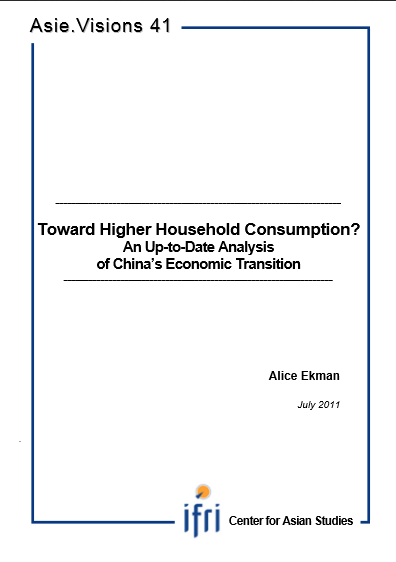Toward Higher Household Consumption? An Up-to-Date Analysis of China's Economic Transition

For more than two decades, China's economy has been growing at an average rate of close to 10 percent. As a result of this stellar performance, China ascended to the rank of the world's second largest economy in 2010, surpassing Japan.
Despite these remarkably high figures, the share of consumption in China's total expenditure has been low. China's economy relies much more heavily on exports and fixed government investments. If China continues on the same path, economic growth would not only become more vulnerable but also unsustainable.
In order to achieve sustainable growth, China needs to rebalance its economy to rely more on domestic consumers. The 12th Five-Year Plan, approved in March 2011, is designed to facilitate this shift by putting in place several large scale measures, including the improvement of the social safety net.
But transforming the nation's growth model will take time and effort. There are significant obstacles to boosting domestic consumption - such as low household income for instance - that government measures may be unable to effectively bypass.
This paper presents these current obstacles in detail and assesses the responses proposed by the 12th Five-Year Plan.

Available in:
ISBN / ISSN
Share
Download the full analysis
This page contains only a summary of our work. If you would like to have access to all the information from our research on the subject, you can download the full version in PDF format.
Toward Higher Household Consumption? An Up-to-Date Analysis of China's Economic Transition
Related centers and programs
Discover our other research centers and programsFind out more
Discover all our analyses
China’s Strategy Toward Pacific Island countries: Countering Taiwan and Western Influence
Over the past decade, China has deployed a diplomatic strategy toward the Pacific Island Countries (PICs). This strategy pursues two main objectives: countering Taiwan's diplomatic influence in the region and countering the influence of liberal democracies in what Beijing refers to as the "Global South."

Opening up the G7 to South Korea to Address Contemporary Global Challenges
The G7’s global influence has diminished as powers like China reshape international governance through initiatives such as BRICS and the Shanghai Cooperation Organisation (SCO). With the G7 now representing just 10 per cent of the world’s population and 28 per cent of global GDP, its relevance is increasingly questioned.
Expanding SPDMM as a pivotal institution in the Pacific – A French perspective
The South Pacific Defence Ministers’ Meeting (SPDMM) is the only forum that brings together defense ministers from the wider South Pacific — including Chile, which is hosting it for the first time. This heterogeneous group of countries with varying resources, capacities, and interests — Australia, Chile, Fiji, France, New Zealand, Papua New Guinea (PNG), and Tonga — are united by their shared determination to strengthen cooperation on maritime security and humanitarian assistance and disaster relief (HADR) activities.
EU’s Derisking From China: A Daunting Task
With economic security as a major concern, the EU has recently turned to “derisking” from China. The EU strategy entails reducing critical dependencies and vulnerabilities, including in EU supply chains, and diversifying where necessary, while recognizing the importance and need to maintain open channels of communication.











